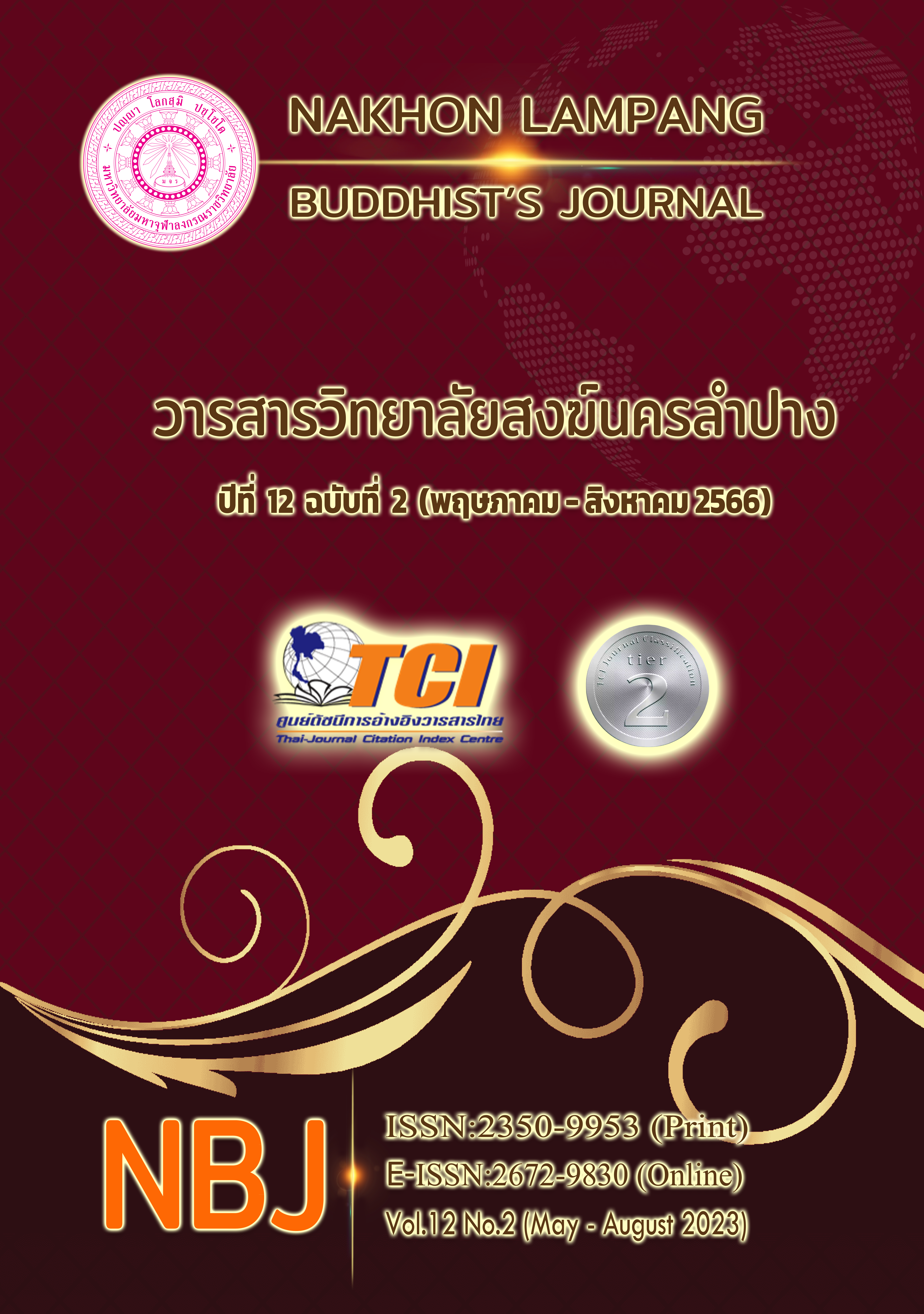แรงจูงใจการศึกษาหลักสูตรโปรแกรมภาษาอังกฤษ: พัฒนาการศึกษาของ โรงเรียนวัฒนานุศาสน์
Main Article Content
บทคัดย่อ
การวิจัยเรื่อง แรงจูงใจในการศึกษาหลักสูตรภาษาอังกฤษ: พัฒนาการศึกษาของโรงเรียนวัฒนานุศาสน์ มีวัตถุประสงค์ ได้แก่ เพื่อศึกษาแรงจูงใจในการเลือกเรียนหลักสูตรภาษาอังกฤษแบบเข้มข้น ของนักเรียนโรงเรียนวัฒนานุศาสน์ และเพื่อหาข้อเสนอแนะในการในการเลือกเรียนหลักสูตรภาษาอังกฤษแบบเข้มข้น ของนักเรียนโรงเรียนวัฒนานุศาสน์ เป็นวิจัยผสมผสาน โดยวิธีเชิงปริมาณศึกษากลุ่มนักเรียนหลักสูตรภาษาอังกฤษ ของนักเรียนโรงเรียนวัฒนานุศาสน์ จังหวัดชลบุรี เก็บข้อมูลจากกลุ่มตัวอย่าง จำนวน 400 คน ด้วยแบบสอบถาม ทำการวิเคราะห์ข้อมูลด้วยสถิติพรรณา ร้อยละ ค่าเฉลี่ยส่วนเบี่ยงเบนมาตรฐาน และ t – Test F – Test (ANOVA) และเชิงคุณภาพโดยการสัมภาษณ์นักเรียนหลักสูตรภาษาอังกฤษแบบเข้มข้น จำนวน 5 คน ครูโรงเรียนวัฒนานุศาสน์ จำนวน 3 คน และผู้บริหารโรงเรียนจำนวน 1 คน ผลการวิจัย พบว่า ประเด็นที่หนึ่ง แรงจูงใจด้านสถานศึกษา พบว่า นักเรียนมีแรงจูงใจภาพรวมอยู่ในระดับมาก (x̄ = 4.01 , S.D.= .99) ประเด็นที่สอง แรงจูงใจด้านสังคม พบว่า นักเรียนมีแรงจูงใจภาพรวมอยู่ในระดับมาก (x̄ = 4.25 , S.D.= .86) ประเด็นที่สาม แรงจูงใจด้านครอบครัว พบว่า นักเรียนมีแรงจูงใจภาพรวมอยู่ในระดับมาก (x̄ = 4.39 , S.D.= .79) ประเด็นสุดท้าย แรงจูงใจด้านปัจจัยภายในของนักเรียน พบว่า แรงจูงใจในการเลือกเรียนหลักสูตร IEP โดยรวมอยู่ในระดับมาก (x̄ = 3.91 , S.D.= 1.0) ทั้งนี้ งานวิจัยให้ข้อเสนอแนะเชิงนโยบาย การนำไปปฎิบัติ และการวิจัยในอนาคต
Article Details

อนุญาตภายใต้เงื่อนไข Creative Commons Attribution-NonCommercial-NoDerivatives 4.0 International License.
เอกสารอ้างอิง
Akkachot, N. 2019. Project management model for teaching and learning according to the curriculum of the Ministry of Education in English (English Program: EP) of secondary schools under the Office of the Basic Education Commission. Mahachula Academic Journal, 6(2), 12-30.
Ansongkram, T. (2002). Factors related to learning motivation of Mathayomsuksa 3 Students The school expands educational opportunities Kalasin Province (Master’s Thesis). Mahasarakham . Mahasarakham University.
Badklang, S. et al. (2010). Exploring internal and external motivations in learning English of Students in Yala Rajabhat University (Research Report). Yala Rajabhat University.
Bernard (1970). Mental Health in the Classroom. New York : McGraw – Hill.
Chaiyawoharn, O. (2006). Management conditions according to the educational institute curriculum of basic education institutes. Retrieved November 30, 2022, from https://doi.nrct.go.th/ListDoi/listDetail?Resolve_DOI=10.14457/LPRU.the.2006.6
Deeklang, P., Phannarat, P., & Kreethong, V. (2007). Factors Affecting Motivation to Come to Study of Students in the First Level of Thanakornsongkro School Nong Khai Province. Journal Faculty of Education Srinakharinwirot University, 8(3), 471.
Dollard, J., & Miller, N. E. (1950). Personality and psychotherapy; an analysis in terms of learning, thinking, and culture. McGraw-Hill.
Good, C. (1973). Dictionary of Education. Edited by Carter V. Good. New York: McGraw – Hill book Company, Inc.
Kaplan, E.L. & Meier, P. (1959). Nonparametric Estimation from Incomplete Observations. Journal of the American Statistical Association. Retrieved November 30, 2022, from https://doi.org/10.1080/01621459.1958.10501452.
Khaocharoen, S. (2005). A Study of Learning Motivation of Green Students in Grade 4. (Master’s Thesis). Bangkok: Srinakharinwirot University.
Kreesaeng, A. (1983). Educational Psychology. (3rd ed). Phitsanulok : Srinakharinwirot University Textbook Project.
Moos, Rudolf H. & Bemice, S. Moors. (1978). Classroom Social Climate and Student Essences and Grades. Journal of Educational Psychology, 70(4), 863–869.
Moos, Rudolf H. (1934). The human context: environmental determinants of behavior. (2nd ed.). China: internetarchivebooks.
Phanmanee, A. (1999). Instructional Psychology. Bangkok: Ton Aor.
Phupongpattana, S. (2004). The motivation for learning of junior high school students in a demonstration school. (Master’s Thesis). Bangkok. Chulalongkorn University.
Promchan, S. (1997). Variables related to learning motivation of lower secondary school students In the school expanding educational opportunities in Nakhon Si Thammarat Province. (Master’s Thesis). Bangkok. Srinakharinwirot University.
Phromlai, T. (2009). Factors Affecting Motivation in Studying Science of Secondary School Students 3rd year under Sisaket Educational Service Area Office 4. (Master’s Thesis). Ubon Ratchathani. Ubon Ratchathani Rajabhat University.
Thephasadin Na Ayutthaya, W. (1987). Student personnel work. Bangkok: Faculty of EducationChulalongkorn University.
Thirasilawet, A. (2005). Mental characteristics and social factors related to learning responsibilities of Mathayomsuksa 3 students under Mahasarakham Educational Service Area Office 1. (Master’s Thesis). Mahasarakham. Mahasarakham University.
Wattananusas School. (2020). History of Wattananusas School. Retrieved November 3, 2022, from https: //www.wns.ac.th/.
Wicharaphot, S. (2006). A classification analysis of factors influencing students' academic performance.Mahasarakham University with high and low grades. (Master’s Thesis). Mahasarakham. Mahasarakham University.
Woolfolk, A.E. (1993). Educational psychology. Boston: Allyn and Bacon. Cited: Kurt, S. “Constructivist Learning Theory,” in Educational Technology. Retrieved November 21, 2022, from https://educationaltechnology.net/constructivist-learning-theory/.
Yodmongkol, K. (2009). English skills development model for English language teachers at basic education level Case study: Bannamphu School, Mueang Loei District, Loei Province. (Master’s Thesis). Loei Rajabhat University: Loei.

